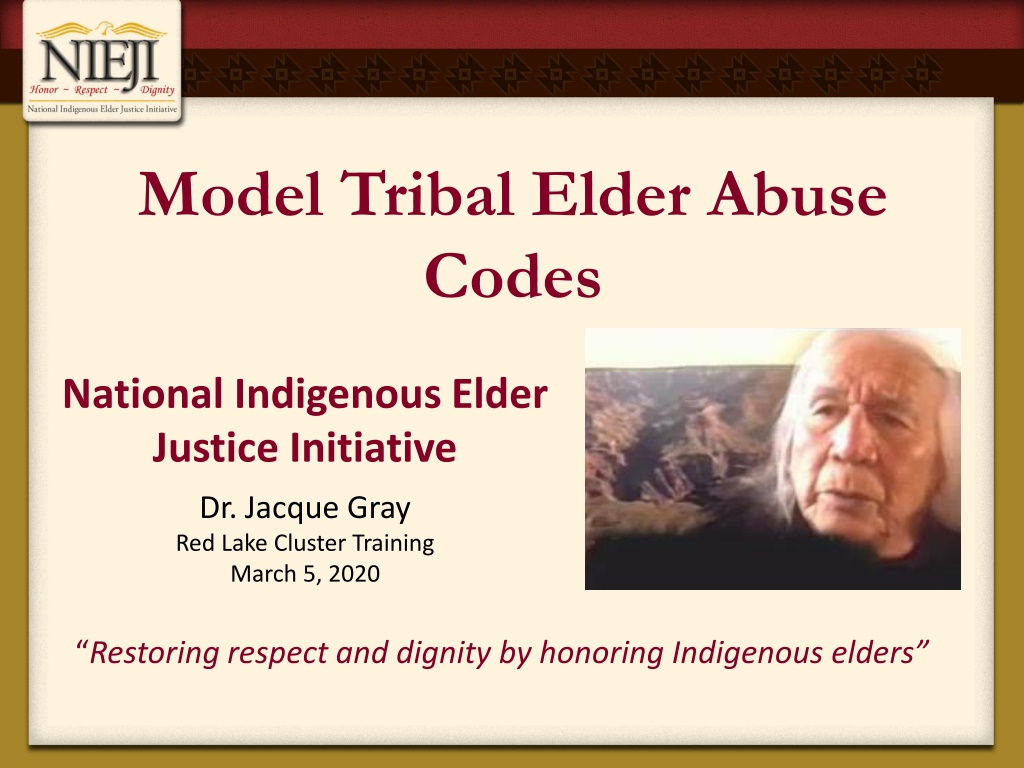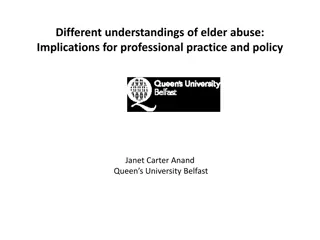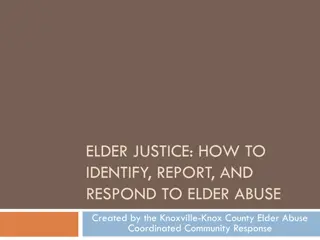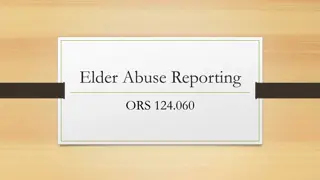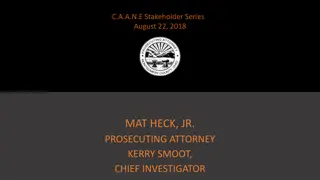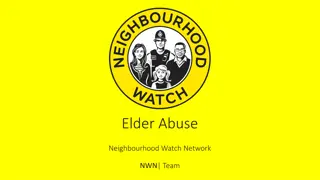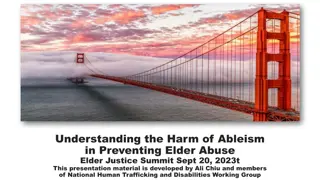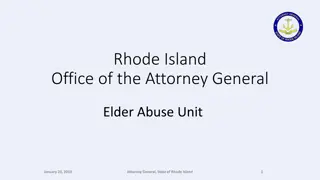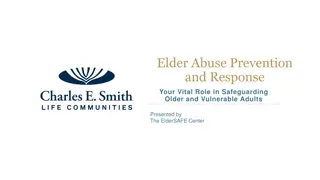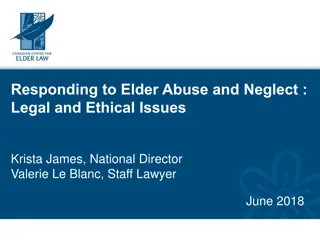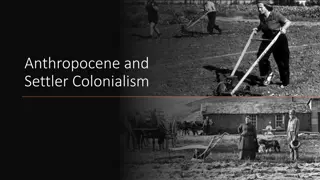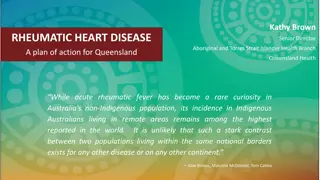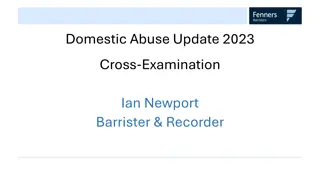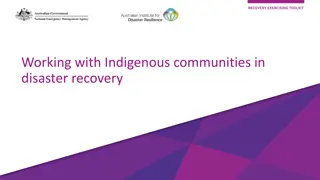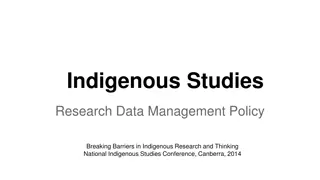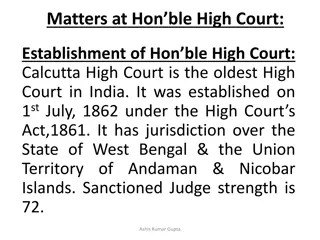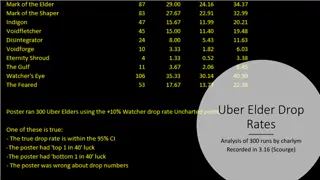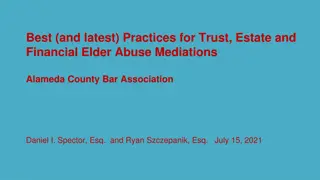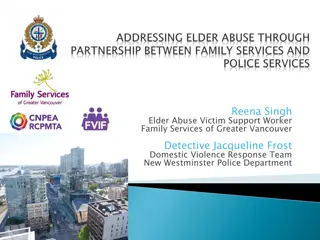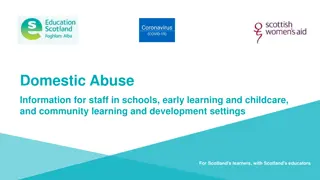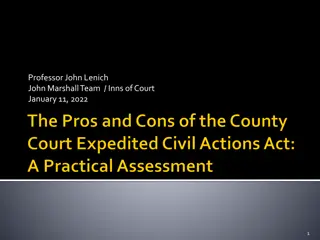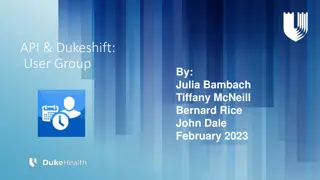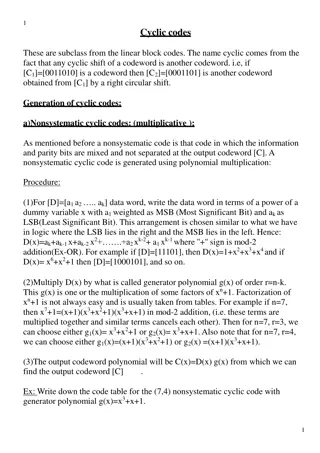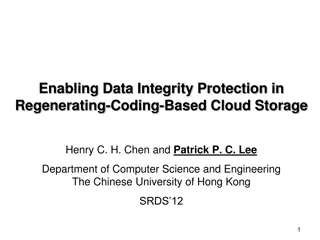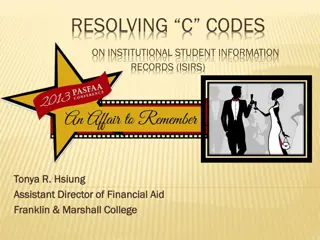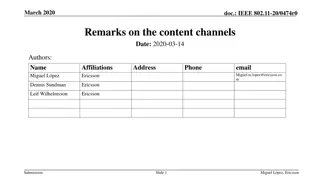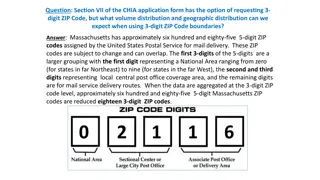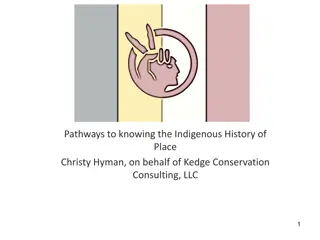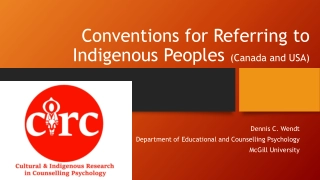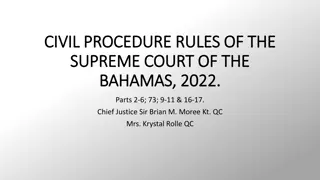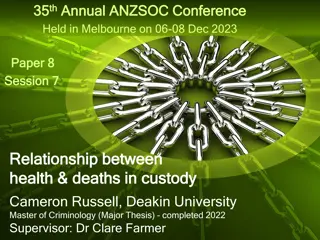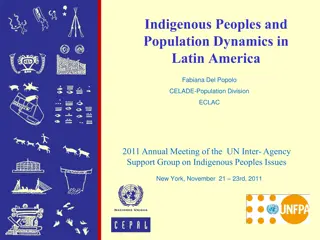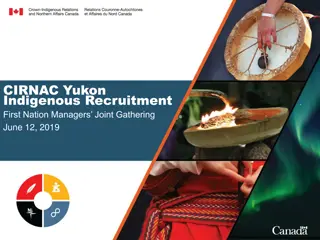Indigenous Elder Abuse Codes and Civil Court Procedures
The National Indigenous Elder Justice Initiative aims to restore respect and dignity by honoring Indigenous elders. The initiative identified 47 tribes with existing Elder Abuse Codes in 2012, which has now expanded to 100 tribes across 27 states. The Civil Elder Abuse Code outlines reporting duties, investigations, protective services, rights of elders and caregivers, and more. Civil courts address harm through monetary or equitable relief, while criminal courts prosecute individuals for breaking the law.
Download Presentation

Please find below an Image/Link to download the presentation.
The content on the website is provided AS IS for your information and personal use only. It may not be sold, licensed, or shared on other websites without obtaining consent from the author. Download presentation by click this link. If you encounter any issues during the download, it is possible that the publisher has removed the file from their server.
E N D
Presentation Transcript
Model Tribal Elder Abuse Codes National Indigenous Elder Justice Initiative Dr. Jacque Gray Red Lake Cluster Training March 5, 2020 Restoring respect and dignity by honoring Indigenous elders
NIEJI Vision: Restore respect and dignity by honoring indigenous elders.
Elder Abuse Code Information In 2012, through the tribal contacts NIEJI identified 47 Tribes with existing Elder Abuse Code The 47 Tribes were located in 17 different states In 2019, through tribal contacts and law searches, 100 Tribes have Elder Abuse Codes 100 Tribes in 27 different states. List of Tribes available at nieji.org/codes Model Criminal Elder Abuse Code Developed Model Civil Elder Abuse Code Developed
Civil Courts In a civil suit, one party (the plaintiff) who feels they were harmed brings a complaint against another party (the defendant). Reasonable doubt is not required. A "preponderance of evidence" is enough in most cases. The plaintiff can either ask for monetary relief, or equitable relief Monetary relief is when the plaintiff asks for a cash award to remedy the situation. Equitable relief is when the plaintiff asks for the court to order the other party to do or not to do something.
Criminal Courts The government (the plaintiff) brings suit against (prosecutes) a person who they believe has broken the law (the defendant). The guilt of the defendant must be proven beyond a reasonable doubt. If the defendant is convicted, he or she may have to serve time in jail or pay a fine
Civil Elder Abuse Code 1. Title 2. Authority 3. Policy 4. Purpose 5. Civil Nature of Code 6. Definitions 7. Duty to Report Abuse or Neglect of an Elder 7.1 Confidentiality 7.2 Standard of Proof 7.3 Immunity for Reporting 7.4 Failure to Report; Civil Penalty; Damages; Criminal Liability 7.5 Bad Faith Report; Civil Penalty; Damages; Criminal Liability 7.6 Reports 7.7 Investigation 7.8 Interference with Investigation and Retaliation Prohibited; Civil Penalty; 7.9 Privileged Communication 7.10 Criminal Investigation 8. Elder Protective Services and Elder Protective Placement; Other Services; Evaluation Procedure; Duty to Pay 9. Emergency Protection Order 10. Rights of Elders, Their Families and Caregivers 11. Procedures for Determining Incapacity, Abuse, Neglect or Exploitation 12. Confidentiality of Reporter, Records, Hearings; Penalty for not Complying with Confidentiality 13. Elder Protection Order; Time Limits 14. Deferring Criminal Prosecution (Optional) 15. Petition; Hearing
1. Title 2. Authority 3. Policy 4. Purpose 5. Civil Nature of Code 6. Definitions 7. Duty to Report Abuse or Neglect of an Elder 7.1 Confidentiality 7.2 Standard of Proof 7.3 Immunity for Reporting 7.4 Failure to Report; Civil Penalty; Damages; Criminal Liability 7.5 Bad Faith Report; Civil Penalty; Damages; Criminal Liability 7.6 Reports 7.7 Investigation 7.8 Interference with Investigation and Retaliation Prohibited; Civil Penalty; 7.9 Privileged Communication 7.10 Criminal Investigation 8. Elder Protective Services and Elder Protective Placement; Other Services; Evaluation Procedure; Duty to Pay 9. Emergency Protection Order 10. Rights of Elders, Their Families and Caregivers 11. Procedures for Determining Incapacity, Abuse, Neglect or Exploitation 12. Confidentiality of Reporter, Records, Hearings; Penalty for not Complying with Confidentiality 13. Elder Protection Order; Time Limits 14. Deferring Criminal Prosecution (Optional) 15. Petition; Hearing
1. Title This code shall be known and cited as the "[Name of enacting Tribe or Nation] Elder Protection Code.
2. Authority 3. Policy 4. Purpose 5. Civil Nature of Code 6. Definitions 7. Duty to Report Abuse or Neglect of an Elder 7.1 Confidentiality 7.2 Standard of Proof 7.3 Immunity for Reporting 7.4 Failure to Report; Civil Penalty; Damages; Criminal Liability 7.5 Bad Faith Report; Civil Penalty; Damages; Criminal Liability 7.6 Reports 7.7 Investigation 7.8 Interference with Investigation and Retaliation Prohibited; Civil Penalty; 7.9 Privileged Communication 7.10 Criminal Investigation 8. Elder Protective Services and Elder Protective Placement; Other Services; Evaluation Procedure; Duty to Pay 9. Emergency Protection Order 10. Rights of Elders, Their Families and Caregivers 11. Procedures for Determining Incapacity, Abuse, Neglect or Exploitation 12. Confidentiality of Reporter, Records, Hearings; Penalty for not Complying with Confidentiality 13. Elder Protection Order; Time Limits 14. Deferring Criminal Prosecution (Optional) 15. Petition; Hearing 1. Title
2. Authority [Cite all relevant sections of Tribe or Nation's constitution, charter or governing documents that grant the Tribe or Nation's legislature or lawmaking body the authority to enact laws prohibiting and regulating conduct, and imposing penalties upon all persons within the jurisdiction of the Tribe or Nation]
3. Policy 4. Purpose 5. Civil Nature of Code 6. Definitions 7. Duty to Report Abuse or Neglect of an Elder 7.1 Confidentiality 7.2 Standard of Proof 7.3 Immunity for Reporting 7.4 Failure to Report; Civil Penalty; Damages; Criminal Liability 7.5 Bad Faith Report; Civil Penalty; Damages; Criminal Liability 7.6 Reports 7.7 Investigation 7.8 Interference with Investigation and Retaliation Prohibited; Civil Penalty; 7.9 Privileged Communication 7.10 Criminal Investigation 8. Elder Protective Services and Elder Protective Placement; Other Services; Evaluation Procedure; Duty to Pay 9. Emergency Protection Order 10. Rights of Elders, Their Families and Caregivers 11. Procedures for Determining Incapacity, Abuse, Neglect or Exploitation 12. Confidentiality of Reporter, Records, Hearings; Penalty for not Complying with Confidentiality 13. Elder Protection Order; Time Limits 14. Deferring Criminal Prosecution (Optional) 15. Petition; Hearing 1. Title 2. Authority
3. Policy It is the policy of the [Tribe or Nation] to continue the traditional respect the members of the [Tribe or Nation] have had for elders. Elders are a valuable resource to the [Tribe or Nation] because they are repositories and custodians of tribal history, language, culture and tradition; and, they are the best hope of the [Tribe or Nation] to pass on the tribal history, language, culture, and tradition to children of the [Tribe or Nation]. Thus, the interests of the [Tribe or Nation], now and in the future, are advanced when its Elders can be confident they are protected from abuse, neglect, and exploitation and are free to fully participate in the activities and proceedings of the [Tribe or Nation].
4. Purpose 5. Civil Nature of Code 6. Definitions 7. Duty to Report Abuse or Neglect of an Elder 7.1 Confidentiality 7.2 Standard of Proof 7.3 Immunity for Reporting 7.4 Failure to Report; Civil Penalty; Damages; Criminal Liability 7.5 Bad Faith Report; Civil Penalty; Damages; Criminal Liability 7.6 Reports 7.7 Investigation 7.8 Interference with Investigation and Retaliation Prohibited; Civil Penalty; 7.9 Privileged Communication 7.10 Criminal Investigation 8. Elder Protective Services and Elder Protective Placement; Other Services; Evaluation Procedure; Duty to Pay 9. Emergency Protection Order 10. Rights of Elders, Their Families and Caregivers 11. Procedures for Determining Incapacity, Abuse, Neglect or Exploitation 12. Confidentiality of Reporter, Records, Hearings; Penalty for not Complying with Confidentiality 13. Elder Protection Order; Time Limits 14. Deferring Criminal Prosecution (Optional) 15. Petition; Hearing 1. Title 2. Authority 3. Policy
4. Purpose The purpose of this code is to establish tribal law that protects elders within the jurisdiction of the [Tribe or Nation] from abuse, exploitation and neglect as defined in this code. The code shall be liberally interpreted in order to achieve its purpose and comport with the customs and traditions of the [Tribe or Nation]. The code provides for: Identification and appropriate resolution of abuse and neglect cases; Reporting abuse or neglect to the proper agency; Receiving reports of and investigating suspected abuse or neglect; Delivering elder protection services.
5. Civil Nature of Code 6. Definitions 7. Duty to Report Abuse or Neglect of an Elder 7.1 Confidentiality 7.2 Standard of Proof 7.3 Immunity for Reporting 7.4 Failure to Report; Civil Penalty; Damages; Criminal Liability 7.5 Bad Faith Report; Civil Penalty; Damages; Criminal Liability 7.6 Reports 7.7 Investigation 7.8 Interference with Investigation and Retaliation Prohibited; Civil Penalty; 7.9 Privileged Communication 7.10 Criminal Investigation 8. Elder Protective Services and Elder Protective Placement; Other Services; Evaluation Procedure; Duty to Pay 9. Emergency Protection Order 10. Rights of Elders, Their Families and Caregivers 11. Procedures for Determining Incapacity, Abuse, Neglect or Exploitation 12. Confidentiality of Reporter, Records, Hearings; Penalty for not Complying with Confidentiality 13. Elder Protection Order; Time Limits 14. Deferring Criminal Prosecution (Optional) 15. Petition; Hearing 1. Title 2. Authority 3. Policy 4. Purpose
5. Civil Nature of Code This code is civil and does not affect any applicable provision of [the law and order code; criminal code or title] unless they are modified specifically by this code.
6. Definitions 7. Duty to Report Abuse or Neglect of an Elder 7.1 Confidentiality 7.2 Standard of Proof 7.3 Immunity for Reporting 7.4 Failure to Report; Civil Penalty; Damages; Criminal Liability 7.5 Bad Faith Report; Civil Penalty; Damages; Criminal Liability 7.6 Reports 7.7 Investigation 7.8 Interference with Investigation and Retaliation Prohibited; Civil Penalty; 7.9 Privileged Communication 7.10 Criminal Investigation 8. Elder Protective Services and Elder Protective Placement; Other Services; Evaluation Procedure; Duty to Pay 9. Emergency Protection Order 10. Rights of Elders, Their Families and Caregivers 11. Procedures for Determining Incapacity, Abuse, Neglect or Exploitation 12. Confidentiality of Reporter, Records, Hearings; Penalty for not Complying with Confidentiality 13. Elder Protection Order; Time Limits 14. Deferring Criminal Prosecution (Optional) 15. Petition; Hearing 1. Title 2. Authority 3. Policy 4. Purpose 5. Civil Nature of Code
6. Definitions A person is guilty of elder abuse if they knowingly and willfully commit the following: PHYSICAL ABUSE is any intentional or negligent infliction of bodily injury, unreasonable confinement, intimidation, or cruel punishment of an elder with resulting physical harm or pain or mental anguish by any person; SEXUAL ABUSE is any physical contact which is not consented to by the elder intended for sexual gratification of any person making such contact or to abuse, humiliate, or degrade the elder; EMOTIONAL ABUSE is the intentional infliction of threats, humiliation, intimidation or any other demeaning behavior towards an elder; EXPLOITATION is the unauthorized or improper use of funds, property, or other resources of an elder; or the unauthorized or improper use of an elder by a caregiver or by any other person for personal gain or profit; or the failure to use the funds, property, or other resources of an elder to the elder's benefit or according to the elder's desires. NEGLECT is the wanton, reckless, and grossly negligent failure of a caregiver to provide for the basic needs of an elder by not supplying resources, services, or supervision necessary to maintain an elder's physical and mental health and includes the inability of an elder to supply such basic needs for himself; interference with the delivery of necessary services and resources; failure to report abuse, exploitation or neglect of an elder by any person; failure to provide services or resources essential to the elder's practice of his customs, traditions or religion; or abandonment of an elder.
6. Definitions (continued) CAREGIVER is a person who is required by tribal law or custom (or state or federal law) to provide services or resources to an elder; a person who has voluntarily undertaken to provide care or resources to an elder; an institution or agency which voluntarily provides or is required by tribal law or custom (state or federal law, or tribal-state agreement) to provide services or resources to an elder; or, an employee of any institution or agency specified within this code. CONSENT is agreement given without intimidation or coercion by an elder with the capacity to make an agreement. ELDER is a person subject to the jurisdiction of the [Tribe or Nation] who is at least [___] years of age. EMERGENCY is a situation in which an elder is immediately at risk of death or injury and is unable to consent to services which would remove the risk. FAMILY is [determined by Tribe or Nation's legal definition and custom]. GOOD FAITH is a reasonable person s honest belief or purpose and the lack of intent to defraud.
6. Definitions (Continued) INCAPACITY is a legal determination made by tribal/state court regarding the current inability (functional inability) of a person to sufficiently understand, make, and communicate responsible decisions about themself as a result of mental illness, mental deficiency, physical illness or disability, or chronic use of drugs or liquor, and to understand the consequences of any such decision. Incapacity may vary in degree and duration and shall not be determined solely on the basis on age. LEAST RESTRICTIVE ALTERNATIVE is an approach which allows an elder independence and freedom from intrusion consistent with the elder's needs by requiring that the least dramatic method of intervention be used when intervention is necessary to protect the elder from harm. Caregivers, tribal/state courts and any other person/entity providing services to elders will be controlled by this standard. POWER OF ATTORNEY is a written document signed by an elder and notarized providing another person with the legal authority to conduct business on behalf of the elder in the name of the elder. There are two main types of power of attorney. A General Power of Attorney covers all the elder's business activities, including signing papers, title documents, contracts, bank accounts, etc. A Special Power of Attorney grants powers limited to specific areas as set forth in the document.
6. Definitions (Continued) PROTECTIVE PLACEMENT is placement of an elder in a hospital, nursing home, residential care facility or the transfer of an elder from one such institution to another by tribal/state court with the elder's consent or appropriate legal authority. PROTECTIVE SERVICES are services provided to an elder with the elder's consent or with appropriate legal authority and include, but are not limited to: social case work, psychiatric and health evaluation, home care, day care, legal assistance, social services, health care, case management, guardianship and other services consistent with this code. Protective services include protective supervision, but they do not include protective placement. RETALIATION is threatening of a reporter mandatory or otherwise of elder abuse or the reporter's family in any way; causing bodily harm to the reporter or the reporter's family; causing the reporter or any of the reporter's family to be terminated, suspended from employment, or reprimanded by an employer; or damaging the reporter's or the reporter's family's real or personal property in any way.
1. Title 2. Authority 3. Policy 4. Purpose 5. Civil Nature of Code 6. Definitions 7. Duty to Report Abuse or Neglect of an Elder 7.1 Confidentiality 7.2 Standard of Proof 7.3 Immunity for Reporting 7.4 Failure to Report; Civil Penalty; Damages; Criminal Liability 7.5 Bad Faith Report; Civil Penalty; Damages; Criminal Liability 7.6 Reports 7.7 Investigation 7.8 Interference with Investigation and Retaliation Prohibited; Civil Penalty; 7.9 Privileged Communication 7.10 Criminal Investigation 8. Elder Protective Services and Elder Protective Placement; Other Services; Evaluation Procedure; Duty to Pay 9. Emergency Protection Order 10. Rights of Elders, Their Families and Caregivers 11. Procedures for Determining Incapacity, Abuse, Neglect or Exploitation 12. Confidentiality of Reporter, Records, Hearings; Penalty for not Complying with Confidentiality 13. Elder Protection Order; Time Limits 14. Deferring Criminal Prosecution (Optional) 15. Petition; Hearing
7. Duty to Report Abuse or Neglect of an Elder Any person who has reasonable cause to suspect that an elder has been abused, neglected, self-neglected, or exploited shall immediately report the abuse, neglect, or self-neglect, or exploitation to the [tribal human services agency, other designated tribal entity] unless they have a privileged relationship as attorney-client, doctor-patient or priest-penitent.
7. Duty to Report Abuse or Neglect of an Elder The following individuals have a special duty in reporting abuse, neglect, self-neglect or exploitation: the elder's family or caregiver as defined within this code; any employee or elected official of the [Tribe or Nation]; any medical doctor, physical therapist, coroner, or medical examiner; any nurse, physician s assistant; or health aide; any dentist or dental hygienist; an elder and adult program services case/social worker, or elder services provider; any mental health practitioner or counselor; any law enforcement officer; any person with a fiduciary duty to the elder, including but not limited to a guardian or employee of elder/nursing home; any [Tribe or Nation] court employee; any person subject to federal reporting requirements (see Title 18 United States Code Section 1169).
7.1 CONFIDENTIALITY The identity of a person who in good faith reports suspected elder abuse, neglect, self-neglect or exploitation is confidential and shall not be released unless the reporter consents or the tribal/state court orders the release because it finds, after notice to the reporter and an opportunity to be heard; that the need to protect the elder outweighs the reporter's interest in confidentiality. 7.2 STANDARD OF PROOF The standard of proof for actions brought under this section is the preponderance of evidence. 7.3 IMMUNITY FOR REPORTING A person who in good faith reports suspected abuse or neglect for an elder is immune from any civil or criminal suit based on that person's report.
7.4 FAILURE TO REPORT; CIVIL PENALTY; DAMAGES; CRIMINAL LIABILITY Any person who is required by this code to report suspected elder abuse and fails to do so is subject to a civil penalty of up to [$5,000]. The [tribal court] shall assess the penalty only after petition, notice, an opportunity for a hearing, and a determination that the person had a mandated duty to report, had good reason to suspect elder abuse or neglect, and failed to report it as required by this code. Further, the person failing to report is subject to any civil suit brought by or on behalf of the elder for damages suffered as a result of the failure to report and to any penalties set out in the [Tribe or Nation's] [criminal code] or as allowed by this code.
7.5 BAD FAITH REPORT; CIVIL PENALTY; DAMAGES; CRIMINAL LIABILITY Any person who makes a report of suspected elder abuse knowing it is to be false is subject to a civil penalty of up to [$5,000]. The [tribal court] shall assess the penalty only after petition, notice, an opportunity for a hearing, and a determination that the reporter made the report knowing it to be false. Further, the reporter is subject to any civil suit brought by or on behalf of the person(s) named as suspected abusers in the false report for damages suffered as a result of the false report, including reasonable attorney's fees, and to any criminal penalties set out in the [Tribe or Nation's] [criminal code] or as allowed by this code.
7.6 REPORTS Reports of suspected elder abuse, neglect, self-neglect or exploitation shall be made to [tribal law enforcement]. The [officer] taking an oral report shall immediately complete a written incident report. Unless anonymously made, the incident report should contain the name of the reporter and, if possible, the reporter should sign the report. Anonymous reports shall be investigated as required by this code. The following information, if possible, should be part of the incident report: the elder's name, address and/or location, telephone number; the name, address or location, telephone number of the person(s) or agency who is suspected of abusing, neglecting, or exploiting the elder; the current general condition of the elder, including the suspected nature and degree of incapacity of the elder, if any; the name, address or location, and telephone number of the witnesses; the name, address or location, telephone number of the elder's family or caregiver; a description of the acts which are complained of as abusive or neglectful; and any other information that the reporter believes might be helpful in establishing abuse, neglect or exploitation.
7.7 INVESTIGATION The [___] shall investigate the report within [hours/days] and prepare a written report of the investigation which shall include the information set out in Section 007.5 as well as the results of interviews, observations, photographs necessary to document injuries or conditions which have or may result in abuse and neglect, assessments and other fact finding. The investigator shall conduct in-person interviews with the elder, elder's family and caregiver, the person or persons suspected of having committed the acts complained of, employees of agencies or institutions with knowledge of the elder's circumstances, and any other person the investigator believes has pertinent information. The existence and contents of medical records and other reports of abuse and neglect shall be ascertained. The investigator personally shall assess the elder's living conditions including the elder's sleeping quarters, using the [Tribe or Nation's] general housing standards. The [tribal court] may issue subpoenas for the release of medical records or financial records upon request of the [Attorney General, other appropriate entity]'s office. Such motions shall receive expedited consideration by the [tribal court] in order to facilitate prompt investigation of reported elder abuse, neglect or exploitation. The investigation report shall be filed with [days] and remain on file and not be destroyed for a period of [years], even if it is determined that there is insufficient evidence to pursue any legal action. However, if the investigating agency determines that the investigation report was made in bad faith, it shall be held and maintained as an inactive file for possible use in a civil violation or proceeding pursuant to Section 007.5 of this code.
7.8 INTERFERENCE WITH INVESTIGATION AND RETALIATION PROHIBITED; CIVIL PENALTY No person shall interfere intentionally with a lawful investigation of suspected elder abuse. No person shall retaliate by any means against any person who has made a good faith report of suspected elder abuse or who cooperates with an investigation of suspected elder abuse. Any person who violates the provisions of paragraphs A or B of this section shall be enjoined from such activity and shall be subject to a civil penalty of up to [$5,000] per occurrence and, if a tribal employee, to appropriate disciplinary action as allowed by the tribal personnel policies and procedures. The penalty shall be assessed by the [tribal court] only after petition, notice, an opportunity to be heard and a determination that either interference or retaliation as set out in this Section occurred. Further, notice of such determination shall be provided to the person's tribal employer and appropriate licensing agencies.
7.9 PRIVILEGED COMMUNICATION No evidentiary privilege, except for the attorney-client, doctor-patient or priest-penitent privilege as detailed in Section 007.0, may be raised as a justifiable defense or reason for failing to report suspected elder abuse or neglect or for testifying as required by this code. 7.10 CRIMINAL INVESTIGATION The investigation and any other procedures allowed by this code may continue regardless of any criminal investigation that might be instigated or pursued by the [Tribe or Nation]. In all instances the safety and welfare of the elder shall be paramount regardless of the nature and status of the investigation.
1. Title 2. Authority 3. Policy 4. Purpose 5. Civil Nature of Code 6. Definitions 7. Duty to Report Abuse or Neglect of an Elder 7.1 Confidentiality 7.2 Standard of Proof 7.3 Immunity for Reporting 7.4 Failure to Report; Civil Penalty; Damages; Criminal Liability 7.5 Bad Faith Report; Civil Penalty; Damages; Criminal Liability 7.6 Reports 7.7 Investigation 7.8 Interference with Investigation and Retaliation Prohibited; Civil Penalty; 7.9 Privileged Communication 7.10 Criminal Investigation 8. Elder Protective Services and Elder Protective Placement; Other Services; Evaluation Procedure; Duty to Pay 9. Emergency Protection Order 10. Rights of Elders, Their Families and Caregivers 11. Procedures for Determining Incapacity, Abuse, Neglect or Exploitation 12. Confidentiality of Reporter, Records, Hearings; Penalty for not Complying with Confidentiality 13. Elder Protection Order; Time Limits 14. Deferring Criminal Prosecution (Optional) 15. Petition; Hearing
8. Elder Protective Services The [tribal human services agency] shall adopt and issue regulations establishing criteria and procedures which comply with the policy and requirements of this code. Protective services or protective placement are provided either on a voluntary or involuntary basis. Such services or placement may be provided on a voluntary basis by the [tribal human services agency] when requested by any abused or neglected elder and the elder is found by the [tribal human services agency] to be in need of such services or placement. Such services or placement shall be provided on an involuntary basis by the [tribal human services agency] only if the [tribal court] determines they are necessary. Such services or placement may be provided on an emergency basis or, if necessary, on a permanent basis through a guardian appointed pursuant to tribal law and shall be provided in a manner least restrictive of the elder's liberty and rights consistent with the elder's welfare and needs. The [tribal court] determination of the degree of incapacity, if any, as well as whether elder abuse or neglect has occurred is the standard the [tribal human services agency] shall use to develop a plan for the delivery of elder protection services.
8. Elder Protective Services Voluntary protective services or protective placement are provided subject to available appropriations and resources and only as determined necessary by the [tribal human services agency]. If the elder's consent to such services or placement is withdrawn, they shall cease. Such protective services or protective placement shall be provided for a period of no more than [days/months] for each occurrence. At the end of each period, the [tribal human services agency] shall reassess the elder's needs before agreeing to continue providing services and placement. Voluntary placement shall not be continued without a [tribal court] order permitting continued voluntary placement after the elder has been in such placement for [days/months]. Involuntary protective services or protective placement shall be provided to any elder who is incapacitated or who is abused, neglected, or exploited and incapacitated and only upon [tribal court] order as required by this code.
Services as determined necessary by the [tribal human services agency] may be delivered to the elder's family or caregiver in order to protect the elder. The [tribal human services agency] shall establish a process for conducting a comprehensive, physical, mental and social [assessment/evaluation/study] of an elder when a petition for a protection order has been filed. The elder, and, where appropriate, the elder's family and caregiver shall be informed by the [tribal human services agency] of rights as allowed under this code and other tribal law, including the right to refuse voluntary services and placement and the right to have the [tribal court] determine the necessity of involuntary services and placement. The elder and where appropriate, the elder's family and caregiver, if able to do so, shall pay for all or part of the costs of services or placement provided to the elder. In the case of voluntary services or placement, the elder and where appropriate, the elder's family and caregiver shall pay the cost as determined by applicable standards and income guidelines.
1. Title 2. Authority 3. Policy 4. Purpose 5. Civil Nature of Code 6. Definitions 7. Duty to Report Abuse or Neglect of an Elder 7.1 Confidentiality 7.2 Standard of Proof 7.3 Immunity for Reporting 7.4 Failure to Report; Civil Penalty; Damages; Criminal Liability 7.5 Bad Faith Report; Civil Penalty; Damages; Criminal Liability 7.6 Reports 7.7 Investigation 7.8 Interference with Investigation and Retaliation Prohibited; Civil Penalty; 7.9 Privileged Communication 7.10 Criminal Investigation 8. Elder Protective Services and Elder Protective Placement; Other Services; Evaluation Procedure; Duty to Pay 9. Emergency Protection Order 10. Rights of Elders, Their Families and Caregivers 11. Procedures for Determining Incapacity, Abuse, Neglect or Exploitation 12. Confidentiality of Reporter, Records, Hearings; Penalty for not Complying with Confidentiality 13. Elder Protection Order; Time Limits 14. Deferring Criminal Prosecution (Optional) 15. Petition; Hearing
9. Emergency Protection Order The [tribal court] shall issue an emergency protection order authorizing protective services or protective placement on an emergency basis upon petition supported by clear and convincing evidence that: the elder is at risk of immediate (physical) harm; the elder is incapacitated and cannot consent to protective services; there is no one is authorized, or the person possessing power of attorney for the elder is unavailable, by law or court order to give consent on an emergency basis; and an emergency exists.
9. Emergency Protection Order The emergency protection order shall: set out the specific emergency services to be provided to the elder to remove the conditions creating the emergency; provide only those services which will remove the emergency; allow protective placement only if the evidence shows that it is necessary; designate the [tribal human services agency] required to implement the order; be issued for a maximum of [hours/days] and may be renewed only once for a maximum of [hours/days] provided the evidence shows that the emergency is continuing.
1. Title 2. Authority 3. Policy 4. Purpose 5. Civil Nature of Code 6. Definitions 7. Duty to Report Abuse or Neglect of an Elder 7.1 Confidentiality 7.2 Standard of Proof 7.3 Immunity for Reporting 7.4 Failure to Report; Civil Penalty; Damages; Criminal Liability 7.5 Bad Faith Report; Civil Penalty; Damages; Criminal Liability 7.6 Reports 7.7 Investigation 7.8 Interference with Investigation and Retaliation Prohibited; Civil Penalty; 7.9 Privileged Communication 7.10 Criminal Investigation 8. Elder Protective Services and Elder Protective Placement; Other Services; Evaluation Procedure; Duty to Pay 9. Emergency Protection Order 10. Rights of Elders, Their Families and Caregivers 11. Procedures for Determining Incapacity, Abuse, Neglect or Exploitation 12. Confidentiality of Reporter, Records, Hearings; Penalty for not Complying with Confidentiality 13. Elder Protection Order; Time Limits 14. Deferring Criminal Prosecution (Optional) 15. Petition; Hearing
10. Rights of Elders, Their Families and Caregivers An elder, the elder's family and caregiver shall be informed about an elder abuse investigation before it begins unless an emergency exists, in which case, they shall be informed as soon as possible, but no later than [___] hours after the investigation begins. An elder may refuse to accept elder protection services even if there is good cause to believe that the elder has been or is being abused, neglected, or exploited provided that the elder is able to care for himself or herself and has the capacity to understand the nature of the services offered. The elder's family or caregiver may refuse for themselves, but not for the elder, those elder protection services offered pursuant to this code. An elder, the elder's family or caregiver may refuse to allow an investigator into their home and the investigator shall so inform the elder, the elder's family and caregiver of this right before seeking entry. The [investigator/law enforcement officer] shall also inform them of the right of the investigator to seek a warrant to gain access.
10. Rights of Elders, Their Families and Caregivers Service of Process. The elder, elder's family and caregiver shall be served personally with a petition filed pursuant to this code. The elder, elder's family and caregiver have the right to attend any proceeding pertaining to the determination of the elder's capacity and the elder shall be present at all proceedings unless the [tribal court] determines the elder's health would be at risk at such proceeding. The elder, elder's family and caregiver have the right to be represented by counsel at all proceedings at [tribal or their own] expense. The elder, elder's family and caregiver have the right to seek independent medical, psychological, or psychiatric evaluation of the elder at the [tribe/elder's or the elder family's] expense.
1. Title 2. Authority 3. Policy 4. Purpose 5. Civil Nature of Code 6. Definitions 7. Duty to Report Abuse or Neglect of an Elder 7.1 Confidentiality 7.2 Standard of Proof 7.3 Immunity for Reporting 7.4 Failure to Report; Civil Penalty; Damages; Criminal Liability 7.5 Bad Faith Report; Civil Penalty; Damages; Criminal Liability 7.6 Reports 7.7 Investigation 7.8 Interference with Investigation and Retaliation Prohibited; Civil Penalty; 7.9 Privileged Communication 7.10 Criminal Investigation 8. Elder Protective Services and Elder Protective Placement; Other Services; Evaluation Procedure; Duty to Pay 9. Emergency Protection Order 10. Rights of Elders, Their Families and Caregivers 11. Procedures for Determining Incapacity, Abuse, Neglect or Exploitation 12. Confidentiality of Reporter, Records, Hearings; Penalty for not Complying with Confidentiality 13. Elder Protection Order; Time Limits 14. Deferring Criminal Prosecution (Optional) 15. Petition; Hearing
11. Procedure for Determining Incapacity, Abuse, Neglect or Exploitation The [tribal court] shall determine whether an elder is incapacitated and the degree of incapacity, and, where necessary, whether elder abuse, neglect, or exploitation has occurred. The determination of incapacitation shall be made only after petition, notice, and hearing. The [tribal court] shall determine whether an elder has been a victim of abuse, neglect or exploitation as defined in this code.
1. Title 2. Authority 3. Policy 4. Purpose 5. Civil Nature of Code 6. Definitions 7. Duty to Report Abuse or Neglect of an Elder 7.1 Confidentiality 7.2 Standard of Proof 7.3 Immunity for Reporting 7.4 Failure to Report; Civil Penalty; Damages; Criminal Liability 7.5 Bad Faith Report; Civil Penalty; Damages; Criminal Liability 7.6 Reports 7.7 Investigation 7.8 Interference with Investigation and Retaliation Prohibited; Civil Penalty; 7.9 Privileged Communication 7.10 Criminal Investigation 8. Elder Protective Services and Elder Protective Placement; Other Services; Evaluation Procedure; Duty to Pay 9. Emergency Protection Order 10. Rights of Elders, Their Families and Caregivers 11. Procedures for Determining Incapacity, Abuse, Neglect or Exploitation 12. Confidentiality of Reporter, Records, Hearings; Penalty for not Complying with Confidentiality 13. Elder Protection Order; Time Limits 14. Deferring Criminal Prosecution (Optional) 15. Petition; Hearing
12. Confidentiality Name of Reporter. The name of the person who reports abuse or neglect as required by this code is confidential and shall not be released to any person unless the reporter consents to the release or release is ordered by the [tribal court]. The [tribal court] may release the reporter's name only after notice to the reporter is given, a closed evidentiary hearing is held, and the need to protect the elder is found to be greater than the reporter's right to confidentiality. The reporter's name shall be released only to the extent determined necessary to protect the elder. Investigation and Hearing Records. Records of an investigation of elder abuse or of a [tribal court] hearing regarding elder abuse are confidential. Such records shall be open only to the elder and the elder's family and caregiver unless the family or caregiver is the suspected abuser., If the [director of the tribal human services agency or other designated entity], law enforcement officers, court officials, coroner and medical examiner or any other person who has reason to believe than an elder died as the result of abuse, neglect or exploitation, the [tribal court] will determine who has reasonable cause to have access to such records. Court Proceedings. A proceeding held pursuant to this code shall, at the option of the elder who is not incapacitated, be closed and confidential. Persons who may attend are the elder, the elder's family and caregiver, [the person or representative of an institution or agency accused of elder abuse], the representative of the [tribal human services agency], necessary [tribal court] officials and attorneys for the parties. If the hearing is closed, other persons may appear only to testify. No one attending or testifying at such a proceeding shall reveal information about the proceeding unless ordered to do so by a [tribal court] order. Penalty. Any person who violates any paragraph of this section shall be subject to a civil penalty of up to [$5,000] per occurrence. The [tribal court] shall assess the penalty after petition, notice, opportunity to be heard, and a determination that a violation occurred. In addition, if the violation is committed by an employee of the [Tribe or Nation], the employee shall also be subject to employee disciplinary action as allowed in the [Tribe or Nation's] employment laws.
1. Title 2. Authority 3. Policy 4. Purpose 5. Civil Nature of Code 6. Definitions 7. Duty to Report Abuse or Neglect of an Elder 7.1 Confidentiality 7.2 Standard of Proof 7.3 Immunity for Reporting 7.4 Failure to Report; Civil Penalty; Damages; Criminal Liability 7.5 Bad Faith Report; Civil Penalty; Damages; Criminal Liability 7.6 Reports 7.7 Investigation 7.8 Interference with Investigation and Retaliation Prohibited; Civil Penalty; 7.9 Privileged Communication 7.10 Criminal Investigation 8. Elder Protective Services and Elder Protective Placement; Other Services; Evaluation Procedure; Duty to Pay 9. Emergency Protection Order 10. Rights of Elders, Their Families and Caregivers 11. Procedures for Determining Incapacity, Abuse, Neglect or Exploitation 12. Confidentiality of Reporter, Records, Hearings; Penalty for not Complying with Confidentiality 13. Elder Protection Order; Time Limits 14. Deferring Criminal Prosecution (Optional) 15. Petition; Hearing
13. Elder Protection Order; Time Limits If the [tribal court) determines that an elder is incapacitated or incapacitated and abused, neglected, or exploited, the (tribal court) shall issue an elder protection order which provides appropriate protection for the elder. Such protection may include, but is not limited, to the following: Removing the elder from the place where the abuse or neglect has taken or is taking place for no longer than (___) days; Removing the person who has abused or neglected an elder from the elder's home; Restraining the person who has abused or neglect an elder from continuing such acts; Placing the elder under protective supervision, wherein the elder is permitted to remain in the home providing the Department or a designated agent provides supervision and assistance to correct the abuse, neglect or exploitation of the elder; Requiring an elder's family or caregiver or any other person with a fiduciary duty to the elder to account for the elder's funds and property; Requiring any person who has abused, neglected, or exploited an elder to pay restitution to the elder for damages resulting from that person's wrongdoing; Appointing a (representative) (guardian ad litem) for the elder; Recommending that a representative payee be named; and, Ordering the (tribal human services agency) to prepare a plan for and deliver elder protection services which provide the least restrictive alternatives for services, care, treatment, or placement consistent with the elder's needs.
13. Order No protection order shall be issued until (___) days after the petition is served on all parties, except for an emergency protection order. An initial non-emergency elder protection order shall be issued for a period not to exceed (____). The non-emergency protection order may be extended as many times as necessary to protect the elder. An extension of a protection order can only be issued after a petition is filed by the party seeking an extension and notice, opportunity for hearing, and a determination based on (clear and convincing proof) (preponderance of the evidence) that such an extension is necessary for the protection of the elder. Each extension shall be for a period not to exceed (___) days.
1. Title 2. Authority 3. Policy 4. Purpose 5. Civil Nature of Code 6. Definitions 7. Duty to Report Abuse or Neglect of an Elder 7.1 Confidentiality 7.2 Standard of Proof 7.3 Immunity for Reporting 7.4 Failure to Report; Civil Penalty; Damages; Criminal Liability 7.5 Bad Faith Report; Civil Penalty; Damages; Criminal Liability 7.6 Reports 7.7 Investigation 7.8 Interference with Investigation and Retaliation Prohibited; Civil Penalty; 7.9 Privileged Communication 7.10 Criminal Investigation 8. Elder Protective Services and Elder Protective Placement; Other Services; Evaluation Procedure; Duty to Pay 9. Emergency Protection Order 10. Rights of Elders, Their Families and Caregivers 11. Procedures for Determining Incapacity, Abuse, Neglect or Exploitation 12. Confidentiality of Reporter, Records, Hearings; Penalty for not Complying with Confidentiality 13. Elder Protection Order; Time Limits 14. Deferring Criminal Prosecution (Optional) 15. Petition; Hearing
14. Deferring Criminal Prosecution Criminal prosecution of any person accused of elder abuse or neglect may be deferred or dismissed [consistent with tribal/state procedures]: The crime is not of a serious nature involving intentional bodily injury or intentional property damage; The accused person does not have prior record of abuse, neglect or exploitation relating to elders, adults, children, or otherwise; The elder, the elder's family and caregiver, (and the accused, if not a family member or caregiver) agree to resolve conflicts either through counseling, tribal peacemakers program, mediation, family restoration treatment or other tribally recognized dispute resolution process; All parties involved abide by a (tribal court) ordered elder protection plan; and, Possible future prosecution would not be hindered by foreseeable unavailability of witnesses.
